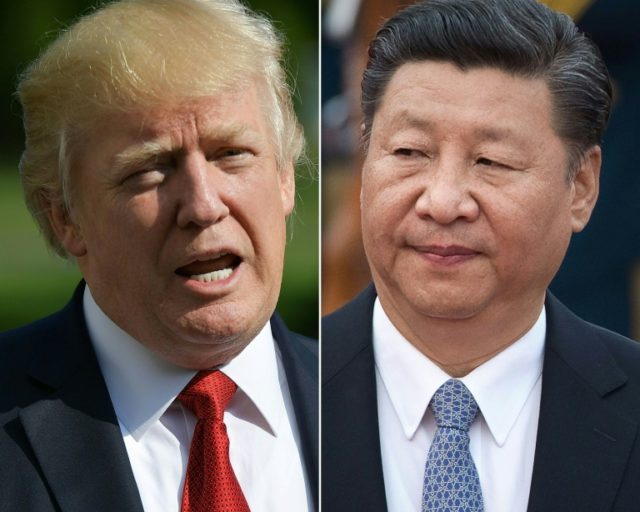Washington (United States) (AFP) – President Donald Trump’s hard line on trade with China has fueled fears of an economically-damaging trade war, while his swings from threat to praise have generated uncertainty among businesses.
But trade experts concede the pressure on China to reform could actually work, especially as it is in Beijing’s own interests to make the reforms the US is demanding.
Trump’s Twitter feed maps his lurches from tough talk to optimism and back again, a pattern that has left businesses alternately alarmed and relieved.
China “must end unfair trade, take down barriers,” Trump tweeted April 7.
That was followed on April 8 by this tweet:
“President Xi (Jinping) and I will always be friends, no matter what happens with our dispute on trade.”
Just Thursday, Trump ordered his top aides to look at reentering the 11-nation Trans-Pacific Partnership, from which he withdrew right after taking office, generating a wave of optimism.
But that was quickly quelled when, in a late night tweet, he said he would only rejoin if the US received a “substantially better” deal that the one his predecessor Barack Obama negotiated.
The main source of concern is the escalating tensions with China after Trump last month imposed steep tariffs on steel and aluminum imports, and then then hit Beijing with punitive duties in retaliation for massive theft of US intellectual property.
China struck back, targeting US farmers and pork producers, and an angry Trump then upped the ante and threaten duties on another $100 billion in imports — which have yet to be imposed.
The magnitude of the dispute — if the threats are carried out — would hit consumers and businesses alike.
“The business community worries about escalation of trade tensions, this idea of tit-for-tat that has characterized the past couple of weeks has been troubling,” said Jake Colvin, vice president of the National Foreign Trade Council, a pro-trade business group.
The dispute “creates uncertainty and confusion for the business community,” he told AFP, noting that some firms could be hit by a “double whammy” of higher costs for inputs from China, and higher prices for the goods they export to the country.
– Worse before it gets better –
While businesses share the concern about China’s behavior “the question that we wrestle with is how to make things better and not worse.”
And still to come are tightened restrictions on Chinese investment in sensitive US sectors, due in about a month from the US Treasury Department.
Some Chinese executives already have said they are pausing investments in the US given the confusion, and concerns about the new restrictions.
Robert Manning, a US-China analyst at the Atlantic Council, calls Trump’s view of global trade “nutty,” but acknowledges that his tough talk may be working.
Early this week Xi delivered a major speech in which he promised to reduce import tariffs on US autos and loosen restrictions on investment from US companies, which frequently are required to enter joint ventures as a minority owner in exchange for access to the Chinese market.
Trump quickly thanked Xi for his “kind words” and pledged, “We will make great progress together!”
While some analysts, including the US-China Business Council, cautioned that Xi had made similar promises before and never delivered, Manning said Trump was justified in celebrating.
“If you read carefully the speech Xi gave, you have to give Trump a fair amount of credit. At least at level of rhetoric he checked every box on things Trump has been pushing for,” he told AFP.
“Nonetheless, it’s going to be worse before it gets better,” Manning cautioned.
– What’s the end game? –
While Trump has been impulsive and “ham-fisted,” he said “there are a lot of straws in the wind that could evolve into serious negotiation.
“The madman theory works sometimes, especially when it’s not a theory.”
China is nervous, and at the same time their own companies, like Alibaba and Tencent, are pushing for reforms because they want to be able to invest in the United States, Manning said.
But economists and trade experts are especially concerned that Trump and his aides consistently focus on the US trade deficit with China, which totals over $375 billion.
The trade balance is “not a good way to measure the health of a trade relationship,” Colvin said.
Instead, he argues, Washington should work with allies in Europe and Japan to pressure China to change its policies.
“What’s the end game here? It is important to press the question what are we really trying to achieve and is the current trajectory effective,” Colvin said.
“The goal should not be a temporary reduction of trade deficit with China.”

COMMENTS
Please let us know if you're having issues with commenting.